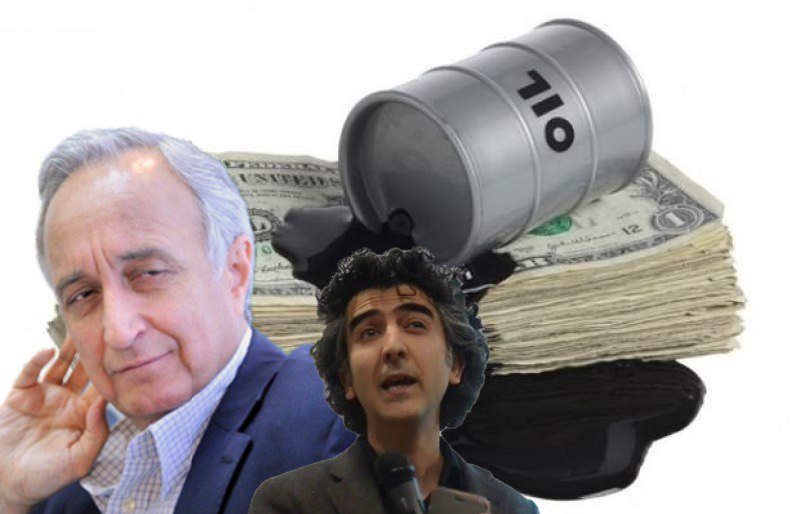The government has a good appetite
The government has a good appetite. According to Iran Gate, a debate that took place yesterday between economist Mousa Ghaninejad and leftist media activist Ali Alizadeh, who believes in the Resistance Axis approach, was broadcast on the fourth channel of the Islamic Republic’s TV and has sparked many reactions. Among these reactions was a significant part of the debate discussing the government’s tax collection while having access to oil revenues.
Ali Alizadeh’s stunned and perplexed expression in response to the golden phrase ‘Then what about the oil money?’ posed by Ghaninejad has been shared repeatedly on social media. Most social media users consider this leftist activist of the Resistance Axis to be the losing side of the debate, which was held last night and has elicited reactions from many social media users as well as experts in the fields of economics and thought.
Ali Alizadeh’s bizarre statements, which were generally incoherent and scattered, were met with civilized and restrained reactions from Mousa Ghaninejad. However, on one of the rare occasions when this experienced economist and Sorbonne graduate reacted to such statements, it was when Alizadeh passionately defended the need for increased tax collection, and Ghaninejad managed to checkmate him with just one sentence, as they say.
This report delves into that single sentence by Ghaninejad and examines the proposition of whether the Islamic Republic can or should collect more taxes from the people. Iran Gate has prepared a two-part file to examine this issue. The present report is the first part of this file, which explores the roots of the taxation issue and compares it in Iran with other countries around the world.
Why do governments collect taxes?
Taxation is the most important economic tool in the world used by rulers to cover the costs of the established government. Governments that have additional revenues naturally do not see themselves in a position where they are forced to use this tool. However, in any case, every governing structure needs financial resources to cover its expenses.
In Iran, this has been common practice since ancient times, and rulers before and after the establishment of a modern state on the Iranian plateau have collected taxes from the people. The Islamic Republic, as well as Reza Shah and Mohammad Reza Shah’s governments, have used taxes to meet the needs of the government as appropriate. Economists also believe that this method of covering government expenses is the best way and does not have the negative and destructive consequences of other methods. However, the attractiveness of taxation for rulers may vary for various reasons, largely depending on the geographical and geo-economic position of countries.
Why do some governments collect more or less taxes?
The way the tax tool is used in different periods and countries depends on some factors, among which the most important is the level of government need for resources derived from taxation. In other words, when governments do not have direct or indirect access to natural resources, they are forced to use the tax lever to a greater extent compared to other countries.
However, when governments have natural resources entirely at their disposal and monopoly, they naturally do not bother themselves and do not resort to tax tools to cover their expenses. Oil-rich governments, including Iran, fall precisely into this category. Therefore, the level of taxation in this system is considerably lower than in countries that do not have access to natural resources.
Do Iranians pay less tax?
When the level of taxation in different countries around the world is examined, it can be seen that the amount of tax paid by Iranian citizens is below the global average. This means that the Islamic Republic apparently collects less tax from the people compared to most countries in the world. However, this unscientific and inaccurate proposition is precisely the point that Alizadeh used in this controversial debate to justify the policy of maximum tax collection by Raisi’s government.
To correctly understand this proposition, it must be understood that due to the imbalance in the distribution of natural resources among different countries of the world, an analytical statistic should be provided. As mentioned earlier, when governments have an alternative source of income, they immediately abandon tax tools and turn to those other resources. Therefore, Iran should be compared with other rentier and oil-rich governments; otherwise, for example, comparing it with Japan’s government, which has one of the highest levels of taxation and lacks natural resources, is an invalid analogy.
So what happens to the oil money?
But looking at the taxation statistics among oil-rich countries, it is clear that the Iranian government collects the most tax from its citizens. However, this statistic was different until the late 2000s, and only part of Iranian society that paid taxes were government employees. The reason for this was the uninterrupted access of rulers to oil revenues, which made them feel no need for tax revenue sources. But the imposition of sanctions by the United States and the United Nations caused Ahmadinejad’s second government to face difficulties in selling oil and forced it to raise the level of taxation and cover a larger portion of its expenses from this source.
This trend has continued with the intensification of sanctions in different periods to the extent that today the Islamic Republic of Iran has the highest level of taxation among oil-based economies. Therefore, it is said that Iranian citizens pay one of the highest tax rates directly and indirectly to the government, and Ali Alizadeh’s claims are pure falsehood.
The second part will address the consequences of tax collection and other reasons for the reluctance of governments to collect taxes if alternative resources are available.
English
View this article in English

